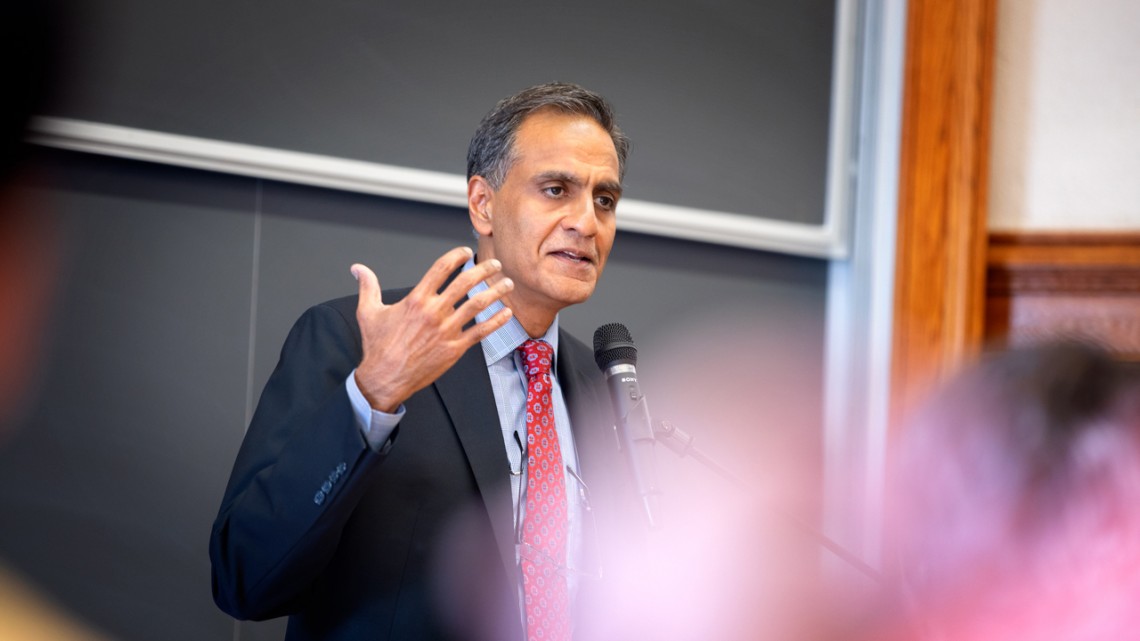
Richard Verma, vice chairman and partner at the Asia Group and former U.S. ambassador to India, gives a lecture Sept. 26 in Myron Taylor Hall to mark the launch of the Cornell India Law Center.
Cornell Law School launches India Law Center
By Owen Lubozynksi
Cornell Law School launched its Cornell India Law Center on Sept. 26 with a lecture by Richard Verma, vice chairman and partner at the Asia Group and former U.S. ambassador to India.
According to Verma, who served as ambassador from 2015-17, the new center comes at a critical moment.
“If there was ever a time when a center like this was needed,” he said, “it’s now.”
Verma gave an overview of U.S.-Indian relations, from Eisenhower and Kennedy’s interest and support, to the lingering distrust instilled by Nixon’s hostility, to the improvement of relations under Clinton and Bush and to the breakthrough of Obama and Modi’s collaboration on the Paris climate agreement.
As for the present, said Verma: “I don’t know where we are today. … The indicators, unfortunately, suggest that we are headed back down.”
The Cornell India Law Center is dedicated to promoting the study of Indian law and policy in the U.S. legal academy and to fostering international collaborations among legal scholars. Guided by a distinguished advisory board and affiliated faculty from law schools in the U.S. and India, the center will offer programming including a speaker series, conferences and a visiting scholar program.
The Law School will also offer a fully funded summer internship for Cornell Law students to work at a public interest organization in New Delhi, starting in the summer of 2020.
The center builds on the strengths of existing India-related programs at the Law School, which partners with Jindal Global Law University in India on a fast-track dual degree program, allowing students to earn Indian and American law degrees in six years. Students enrolled in the International Human Rights Clinic regularly travel to India to conduct research on human rights issues.
“We are extremely excited for this next chapter of Cornell Law School’s engagement with Indian law and legal institutions,” said Sital Kalantry, faculty director of the center and clinical professor of law. “India is the largest democracy in the world. India shares a number of similarities with the United States, including the common law heritage and a pluralistic society. Historically, however, only humanities and social sciences disciplines have studied India. We hope the center will encourage legal scholars and lawyers to consider India as a rich source for comparative studies going forward.”
In his lecture, Verma noted that the current diplomatic relationship between the two countries is young and fragile, and “can’t withstand a lot of shocks.” He also observed that it relies substantially on personal relationships and that it will be strongly influenced by China, as it was by Russia in the 20th century.
“The fact that we are both democracies, and we have shared values, really matters,” Verma said. “And there are consequences if we cast aside those shared values.”
He cautioned that the relationship could become highly transactional, in the model of U.S. relations with many other countries currently, but also emphasized that there is something special about the connection between the U.S. and India.
“Our two constitutions start with the same three words: ‘We the people,’” Verma said. “Henry David Thoreau influenced Gandhi; Gandhi influenced Martin Luther King. The author of the Indian constitution studied at Columbia University. … I could go through hundreds of examples that bind us together in ways that are different.”
He closed by addressing the current and prospective lawyers in the room.
“You do have a special obligation … to look out for the voiceless, look out for the folks that can’t speak up for themselves, the people at the margins,” he said. “If we’re not standing up for our individual citizens in either country, then we’re going to have a challenge in the larger relationship.”
Owen Lubozynski is a freelance writer for the Law School.
Media Contact
Get Cornell news delivered right to your inbox.
Subscribe
